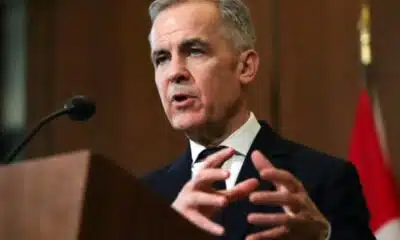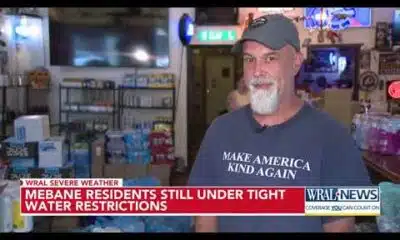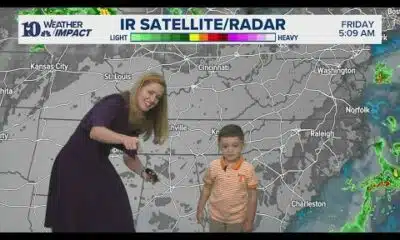News from the South - Virginia News Feed
Unlikely allies unite for probation reform, but Youngkin has final say
Unlikely allies unite for probation reform, but Youngkin has final say
by Charlotte Rene Woods, Virginia Mercury
February 25, 2025
Virginia’s criminal justice future is shaking up the status quo. In a departure from tradition, a probation reform bill is uniting unlikely allies across party lines.
Typically, criminal justice reform in Virginia is championed by Democrats with little Republican backing. However, this year, Del. Wren Williams, R-Patrick, has captured national attention by teaming up with Del. Katrina Callsen, D-Albemarle, on an ambitious probation overhaul.
In the Senate, Sen. Christie New Craig, R-Virginia Beach, advanced a version of the bill.
If enacted, the legislation would allow formerly incarcerated individuals to earn credits towards reductions in their probation terms by achieving key milestones that demonstrate their rehabilitation. These include securing employment for at least 30 hours a week, earning vocational certifications, participating in mental health or substance use treatment programs, and obtaining stable housing and health insurance coverage.
The measure, bolstered by Reform Alliance — a national criminal justice organization founded by rappers Jay Z, Meek Mill and others — is now headed to Gov. Glenn Youngkin’s desk. It also has the backing of the conservative-leaning group Americans For Prosperity, along with several Virginia-based criminal justice organizations such as Nolef Turns and The Humanization Project.
Advocates emphasize that the reform could significantly reduce recidivism — the cycle of reoffending that leads many back behind bars.
Despite Youngkin’s previous veto of a version of the bill carried by Callsen last year, reform supporters are optimistic. They point to the governor’s own initiatives aimed at reducing recidivism by supporting formerly incarcerated individuals.
Notably, just months after rejecting Callsen’s proposal last year, Youngkin issued an executive order directing state agencies to share data and coordinate efforts to help individuals connect to vital resources during their transition from incarceration to freedom.
Reform Alliance policy manager Shawn Weneta said the organization is “excited” to see that the bills advanced with “bipartisan support both within the General Assembly and within the advocacy community.”
“Hopefully (Youngkin) will sign this into law,” Weneta said.
Williams, who has served on the House Courts of Justice Committee with Callsen, was motivated to spearhead the legislation this year after observing a similar law enacted in Florida and recalling how President Donald Trump signed congressional prison reforms during his first term.
Williams stated that the bipartisan drive for probation reform is “recognition that the punitive approach has not worked.” He added, “By prioritizing rehabilitation, Virginia is building a more effective, efficient criminal justice system that benefits individuals, communities, and taxpayers alike.”
He emphasized that reducing probation can help formerly incarcerated individuals “rebuild their lives out of the American Dream” and contribute to creating safer communities for all.
While Lt. Gov. Winsome Earle-Sears did not comment directly on the legislation, she expressed a shared ethos behind the reform.
During a Feb. 12 segment on The John Fredericks Show, Earle-Sears explained that “we want to do as much as possible to ensure that we don’t spend the money twice.”
She was discussing broader access to educational and vocational opportunities for incarcerated individuals, aiming to help with employment and housing once their sentences are completed.
“If we can give them incentives then we can get them engaged, get them an education… Then if you have a job of course there’s something about work that dignifies the soul,” she said. “I’m all for lifting up that soul.”
Earle-Sears, who previously spent time in prison ministry before her election to statewide office, shared how such work offered a sense of l hope to people during times when it may be scarce.
She also spoke about providing housing to former inmates could reduce recidivism, helping individuals get back on their feet.
“You’re not gonna go steal and create mayhem to pay for shelter,” she remarked.
During the conversation, Fredricks also asked her specifically about the legislation, expressing that he is “in favor of” it. While she did not directly state her support, she pointed out the strong bipartisan support it received, meaning her tie-breaking vote wasn’t necessary.
Should Youngkin choose to not sign Williams’ and New Craig’s bill, the lawmakers could try again next year, with a different executive branch in place.
As Earle-Sears is running for governor, she could potentially have more opportunities to weigh in on a future version of the proposal.
YOU MAKE OUR WORK POSSIBLE.
Virginia Mercury is part of States Newsroom, a nonprofit news network supported by grants and a coalition of donors as a 501c(3) public charity. Virginia Mercury maintains editorial independence. Contact Editor Samantha Willis for questions: info@virginiamercury.com.
The post Unlikely allies unite for probation reform, but Youngkin has final say appeared first on virginiamercury.com
News from the South - Virginia News Feed
Quiet basins, for now
SUMMARY: Chief Meteorologist Tim Panda reports a quiet start to the 2025 hurricane season on July 10th, with both the Atlantic and eastern Pacific basins showing little activity despite nearing the peak in early to mid-September. A notable historical reference was Hurricane Dennis, a weakening Category 4 that hit Pensacola as a Category 3 on this date in 2005. Currently, high pressure and dry air suppress storms in the Atlantic, though some tropical waves are present near Africa. The Northern Gulf shows a low 20% chance of development in the next two weeks. The East Pacific is also quiet after an active start.
While there’s not much tropical activity at the moment, Chief Meteorologist Tim Pandajis looks even further into the future using the latest long-range models.
Subscribe: https://www.youtube.com/user/wvectv/?sub_confirmation=1
Download the 13News Now app: https://bit.ly/13NewsNowApp
Watch 13News Now+ for free on streaming: https://www.13newsnow.com/13NewsNowPlus
Check out our website: https://www.13newsnow.com/
Like us on Facebook: https://www.facebook.com/13newsnow/
Follow us on X/Twitter: https://x.com/13newsnow
Follow us on Instagram: https://www.instagram.com/13newsnow/
News from the South - Virginia News Feed
As partisan disputes boil, it’s still unclear how new federal law will impact Medicaid in Virginia
by Charlotte Rene Woods, Virginia Mercury
July 10, 2025
The “big beautiful bill” was passed by both chambers of Congress and last week, President Donald Trump signed it into law, triggering a countdown until sweeping changes to Medicaid take effect, including potential coverage loss for millions nationwide, financial strain to hospitals and new work requirements for Medicaid recipients. While the changes won’t kick in for more than a year, Virginia lawmakers are already preparing for the transformation of the state’s health care landscape.
It’s still unclear exactly how many Virginians could lose Medicaid coverage because final analyses from the nonpartisan Congressional Budget Office (CBO) haven’t dropped yet. The uncertainty has left many wondering if they or loved ones will be impacted — and set the stage for partisan bickering.
Democrats have warned for weeks that over 322,000 Virginians could lose health insurance, based on a state-by-state breakdown from the U.S. Senate’s Joint Economic Committee and previous CBO estimates released as the bill made its way through Congress.
What happens to Medicaid in Virginia if massive federal bill to slash billions becomes law?
Gov. Glenn Youngkin said Tuesday that figure is “literally made up,” while other Republicans have pointed to a 7-year-old state study, conducted before Virginia expanded its Medicaid program in 2018, to claim far fewer would be booted from Medicaid.
Clearer understandings of just what will happen to Medicaid in Virginia and other states may be best found in future OMB reports but its most recent estimates found 10.8 million Americans nationwide could lose insurance as a result of the bill.
‘A moving target’
The bill’s rapid race over the finish line, from the House to the Senate to Trump’s desk in a span of mere weeks, could be the root of confusion about its full impact concerning health care, and lawmakers’ differing interpretations. Analysts and organizations tracking the legislation also tried to keep pace.
While the CBO was able to do further analysis on the House version of the bill earlier in the summer, the shortened timeline for the Senate version before passage, paired with a federal holiday has contributed to a lack of final analysis.
Freddy Mejia, a policy director with The Commonwealth Institute, noted the whiplash lawmakers and analysts experienced trying to keep track of the House and Senate versions of the OBBB.
The impact between the two different bills is “kind of a bit of a moving target,” he said.
He plans to keep an eye out for further reports from CBO now that OBBB has fully passed.
On a national scale, Democrats have stressed that the number of Americans facing the loss of their Medicaid coverage could be close to 17 million. This, a CBO spokesperson said, is because the office created another analysis with provisions that weren’t in the bill that passed, but which could also have an effect: expiration of ACA premium tax credits and a proposed Health and Human Services rule for marketplaces.
Beyond just health insurance, CBO estimated that in general, resources would decrease for lower-income households while increasing for middle class and higher-income households. That supposition, however, stems from the House version of the bill, supported by Virginia Republican U.S. Reps. Jen Kiggans of Virginia Beach and Rob Wittman of Westmoreland, which did not become law. Fresh CBO review could reveal how people in different income brackets will fare with the new law overall.
Old data, new frustrations
State Republicans’ allegations that Democrats’ Medicaid coverage loss estimations were inflated first circulated as the big beautiful bill wound through congress. This week, the debate came to a head with Youngkin accusing Democrats of “extreme assumptions” at an event announcing a slate of regulatory reductions on Tuesday.
“The number that Democrats are throwing around on Virginians who will lose their health coverage is made up,” Youngkin said Tuesday while talking with the media at the event. “They choose extreme assumptions in every measure.”
It’s unclear what data Youngkin is using to refute Virginia Democrats’ Medicaid loss estimates and members of his staff did not respond when asked.
Meanwhile, Republicans in Virginia’s House of Delegates have cited n a 2018 study from the Joint Legislative Audit and Review Commission (JLARC). Garren Shipley, a communications staffer for the House Republican Caucus, shared the study with emphasis that the party doesn’t believe mass disenrollment would happen because of Congress’ bill.
YOU MAKE OUR WORK POSSIBLE.
Like CBO, JLARC is a nonpartisan research entity in state government that lawmakers often tap to study various issues. The 2018 JLARC study Shipley referenced came the same year Virginia expanded its Medicaid program.
At the time, JLARC estimated that about 32% of Virginia’s Medicaid expansion population would be subject to work requirements and 7% would be deterred from enrolling or leaving the program due to the requirements.
As the JLARC study is over seven years old, it’s likely some of its estimations are no longer relevant or accurate. What is certain, however, is that changes to Medicaid requirements and hospital funding mechanisms are on the horizon.
Work requirements, risk to hospitals
Youngkin also framed the work requirements as an important part of Medicaid reform. It’s something state lawmakers had initially considered when expanding the program seven years ago. The new law will require those receiving Medicaid benefits to maintain full-time employment subject to twice-yearly verification, which some lawmakers and advocates say are either unnecessary because many recipients already work, or needlessly burdensome to those living with a disability.
“Redetermination is a really important process,” he said. “It asks us to redetermine every six months, and that gives us a chance to assess who’s gotten a job, (and) who hasn’t complied with the work requirements.”
Youngkin emphasized how Medicaid is supposed to ensure that the “deeply impoverished,” mothers, and children have health insurance rather than able-bodied people “who can get a job and have simply chosen not to.”
Most Medicaid recipients do work, though some like Richmond-area resident Andrew Daughtry, currently do not. A construction worker, he’s tapped into Medicaid for surgeries to recover from an injury that’s left him temporarily unable to work. Earlier this summer he said that it felt “insulting” to have his work ethic questioned.
The twice-yearly employment verification is meant to kick people off their insurance if they aren’t able to keep their jobs while the phase-down of Medicaid provider taxes and state-directed payments are also meant to curb costs for the federal government.
But hospitals warn of heightened chances for closures — particularly in rural areas —- or trimming of offered services and staff. Several hospitals in Southwest and South Side Virginia had already closed obstetrics units, for example, prior to the new congressional bill.
Virginia’s state budget will fund OB-GYN medical residencies amid obstetrics closures
Julian Walker, spokesman for the Virginia Hospital and Healthcare Association, reflected on the intent of the Affordable Care Act — a hallmark law of Democrat Barack Obama’s presidency that allowed states to expand their Medicaid eligibility to provide health care to more people to begin with. The law was about keeping people insured and healthy in order to keep everyone’s bills down.
“The impact is not exclusive to the Medicaid population,” Walker said. “It has ripple effects.”
He noted that uninsured people are likely at or closer to poverty levels than insured people. Without health coverage, they’re more likely to put off preventative care or seek treatment for conditions until emergencies arise.
Walker said people’s conditions are likely to be worse by then — requiring more resources between staff, medications, treatments and length of stay in a hospital. Longer stays mean less available beds for others, regardless of Medicaid status.
Ballad Health CEO Alan Levine, remained vocal on social media throughout the reconciliation process to warn that some hospitals would be strained and likely to close. Sometimes, he tagged Virginia’s congressional Republicans, whose districts include rural hospitals and sizable amounts of Medicaid patients.
Hospitals are also federally required to provide care regardless of whether someone can pay their bills or not, so they absorb that cost while also trying to offset it. As hospitals periodically negotiate with private health insurers, Walker said rates will likely go up for employers and employees with private insurance.
“Different constituencies may feel the impacts differently,” Walker said. “Some more than others — but this has potential to have much more far-reaching implications.”
GET THE MORNING HEADLINES.
Virginia Mercury is part of States Newsroom, a nonprofit news network supported by grants and a coalition of donors as a 501c(3) public charity. Virginia Mercury maintains editorial independence. Contact Editor Samantha Willis for questions: info@virginiamercury.com.
The post As partisan disputes boil, it’s still unclear how new federal law will impact Medicaid in Virginia appeared first on virginiamercury.com
Note: The following A.I. based commentary is not part of the original article, reproduced above, but is offered in the hopes that it will promote greater media literacy and critical thinking, by making any potential bias more visible to the reader –Staff Editor.
Political Bias Rating: Center-Left
This article presents a nuanced view of recent Medicaid legislation, highlighting concerns predominantly raised by Democrats about potential coverage losses and financial strain on hospitals. The language emphasizes the risks to Medicaid recipients and rural healthcare providers, citing nonpartisan sources like the Congressional Budget Office (CBO) and independent state studies. While it includes Republican counterarguments, such as Gov. Youngkin’s dismissal of Democrats’ estimates and references to older studies supporting a less severe impact, the overall framing tends to emphasize the possible negative consequences of the bill on vulnerable populations and public health systems. This leans the piece slightly toward a Center-Left perspective, focusing on social safety nets and healthcare access while maintaining some balance by reporting Republican viewpoints.
News from the South - Virginia News Feed
Federal analyst accessed license plate reader data for immigration enforcement
SUMMARY: Richmond Police Department (RPD) no longer allows government access to its License Plate Reader (LPR) system for immigration enforcement. Despite this, a federal ATF analyst used the LPR program last February to assist in immigration-related operations without RPD’s permission. RPD Chief Rick Edwards condemned this breach, emphasizing that LPR data should not be used for immigration enforcement to maintain community trust. The department disabled its LPR system about a month ago due to concerns over federal misuse. Meanwhile, Chesterfield Police granted limited immigration authority in January but recently revised policies to restrict data sharing with federal agencies. Critics argue such surveillance expansions harm immigrant communities and erode trust in law enforcement.
Federal analyst accessed license plate reader data for immigration enforcement.
-
News from the South - Georgia News Feed7 days ago
'Big Beautiful Bill' already felt at Georgia state parks | FOX 5 News
-
News from the South - Kentucky News Feed5 days ago
Woman arrested in Morgantown McDonald’s parking lot
-
The Center Square7 days ago
Alcohol limits at odds in upcoming dietary guidelines | National
-
The Center Square5 days ago
Here are the violent criminals Judge Murphy tried to block from deportation | Massachusetts
-
News from the South - Texas News Feed6 days ago
Hill Country flooding: Here’s how to give and receive help
-
News from the South - North Carolina News Feed6 days ago
Raleigh caps Independence Day with fireworks show outside Lenovo Center
-
Our Mississippi Home7 days ago
The Other Passionflower | Our Mississippi Home
-
News from the South - Missouri News Feed7 days ago
Shannon County Sheriff alleges ‘orchestrated campaign of harassment and smear tactics,’ threats to life










































